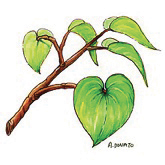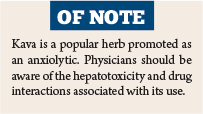Kava
Scientific Name: Piper methysticum
Common Names: Kava-kava, kawa, kavain, rauschpfeffer, intoxicating long pepper, tonga, yagona, and yaqona.
Overview
Kava, a perennial shrub indigenous to the Hawaiian Islands and the Pacific Rim, is known for its relaxant effects and used for social and recreational purposes. The roots and rhizome are used in preparation of a nonfermented beverage that has served as a ceremonial drink in the Pacific Islands for hundreds of years.
Kava is also used in traditional medicine to relieve stress, anxiety, fatigue, and insomnia, as well as to treat menopausal symptoms and urinary tract infections. Over the past 2 decades, it gained popularity in the West, where the supplemental form is promoted for the relief of anxiety, stress, and insomnia.
Clinical data indicate that kava does reduce anxiety, and is viewed by some as an alternative to anxiolytic drugs. However, following concerns about hepatotoxicity, kava and kava-containing products were withdrawn from several European countries and from Australia and Canada. The U.S. Food and Drug Administration issued an advisory about the potential risks of liver injury associated with use of kava.
Based on recommendations made by the World Health Organization, studies of aqueous extracts of kava are underway (all previous studies were conducted with ethanolic or acetonic extracts). Initial research findings support the use of kava for the management of anxiety and depression.
The Science
Kavapyrones are the physiologically active compounds in kava. They function as centrally acting skeletal muscle relaxants, anticonvulsants, and local anesthetics.
Current clinical evidence indicates that kava effectively relieves anxiety,1,2 but a few studies found that it is not superior to placebo.3,4 A systematic review found no negative effects of kava on cognition.5
Because kava causes hepatotoxicity, kava-containing products have been withdrawn in many countries.6,7 Suggested mechanisms for kava-associated hepatotoxicity include inhibition of cytochrome P450, reduction in liver glutathione content, or inhibition of cyclooxygenase activity.6,8
Interestingly, analyses of hepatic injury resulting from kava reveal that low-quality products, overdose, prolonged use, and co-medication represent the causative factors.9 Moreover, recent studies conducted with aqueous extracts of kava found the extracts to be safe and effective against anxiety and depression.10,11
Kava also may have anticancer potential. Data from many Pacific island nations suggest an inverse association between kava consumption and cancer incidence.12 One of kava’s constituents, however, was found to stimulate growth of melanoma cells in vitro.13
Adverse Effects
Hepatotoxicity,6,7 urticaria,14 and reversible dermopathy15 were reported following consumption of kava.
An overdose of kava led to altered mental status and ataxia.16
Herb-Drug Interactions
Benzodiazepines: Kava increases sedation when administered concurrently.17
Cytochrome P450 substrates: Kava inhibits CYP2E118 CYP1A2, 2C8, 2C9, 2C19, 2D6, 3A4,19-21 and can affect the intracellular concentration of drugs metabolized by these enzymes.
Acetaminophen: Kava increases the acetaminophen-induced hepatic cell-cytotoxicity in vitro.22
Disclosure: Ms. Gubili and Drs. Cassileth and Yeung reported no potential conflicts of interest.
References
1. Lehrl S: Clinical efficacy of kava extract WS 1490 in sleep disturbances associated with anxiety disorders. Results of a multicenter, randomized, placebo-controlled, double-blind clinical trial. J Affect Disord 78:101-110, 2004.
2. Witte S, Loew D, Gaus W: Meta-analysis of the efficacy of the acetonic kava-kava extract WS1490 in patients with non-psychotic anxiety disorders. Phytother Res 19:183-188, 2005.
3. Jacobs BP, Bent S, Tice JA, et al: An internet-based randomized, placebo-controlled trial of kava and valerian for anxiety and insomnia. Medicine (Baltimore) 84:197-207, 2005.
4. Sarris J, Scholey A, Schweitzer I, et al: The acute effects of kava and oxazepam on anxiety, mood, neurocognition; and genetic correlates: A randomized, placebo-controlled, double-blind study. Psychopharmacol 27:262-269, 2012.
5. LaPorte E, Sarris J, Stough C, et al: Neurocognitive effects of kava (Piper methysticum): A systematic review. Hum Psychopharmacol 26:102-111, 2011.
6. Clouatre DL: Kava kava: Examining new reports of toxicity. Toxicol Lett 150:85-96, 2004.
7. Escher M, Desmeules J, Giostra E, et al: Hepatitis associated with kava, a herbal remedy for anxiety. BMJ 322:139, 2001.
8. Raman P, Dewitt DL, Nair MG: Lipid peroxidation and cyclooxygenase enzyme inhibitory activities of acidic aqueous extracts of some dietary supplements. Phytother Res 22:204-212, 2008.
9. Teschke R: Kava hepatotoxicity: Pathogenetic aspects and prospective considerations. Liver Int 30:1270-1279, 2010.
10. Sarris J, Kavanagh DJ, Byrne G, et al: The Kava Anxiety Depression Spectrum Study (KADSS): A randomized, placebo-controlled crossover trial using an aqueous extract of Piper methysticum. Psychopharmacology (Berl) 205:399-407, 2009.
11. Singh YN, Devkota AK: Aqueous kava extracts do not affect liver function tests in rats. Planta Med 69:496-499, 2003.
12. Steiner GG: The correlation between cancer incidence and kava consumption. Hawaii Med J 59:420-422, 2000.
13. Matsuda H, Hirata N, Kawaguchi Y, et al: Melanogenesis stimulation in murine B16 melanoma cells by kava (Piper methysticum) rhizome extract and kavalactones. Biol Pharm Bull 29:834-837, 2006.
14. Grace R: Kava-induced urticaria. J Am Acad Dermatol 53:906, 2005.
15. Norton SA, Ruze P: Kava skin condition. Kava dermopathy. J Am Acad Dermatol 31:89-97, 1994.
16. Perez J, Holmes JF: Altered mental status and ataxia secondary to acute kava ingestion. J Emerg Med 28:49-51, 2005.
17. Almeida JC, Grimsley EW: Coma from the health food store: Interaction between kava and alprazolam. Ann Intern Med 125:940-941, 1996.
18. Gurley BJ, Gardner SF, Hubbard MA, et al: In vivo effects of goldenseal, kava kava, black cohosh, and valerian on human cytochrome P450 1A2, 2D6, 2E1, and 3A4/5 phenotypes. Clin Pharmacol Ther 77:415-426, 2005.
19. Russmann S, Lauterburg BH, Barguil Y, et al: Traditional aqueous kava extracts inhibit cytochrome P450 1A2 in humans: Protective effect against environmental carcinogens? Clin Pharmacol Ther 77:453-454, 2005.
20. Russmann S, Lauterburg BH, Helbling A: Kava hepatotoxicity. Ann Intern Med 135:68-69, 2001.
21. Unger M, Frank A: Simultaneous determination of the inhibitory potency of herbal extracts on the activity of six major cytochrome P450 enzymes using liquid chromatography/mass spectrometry and automated online extraction. Rapid Commun Mass Spectrom 18:2273-2281, 2004.
22. Yang X, Salminen WF: Kava extract, an herbal alternative for anxiety relief, potentiates acetaminophen-induced cytotoxicity in rat hepatic cells. Phytomedicine. 18:592-600, 2011.
Jyothirmai Gubili, MS, is Editor, Integrative Medicine Service, Memorial Sloan-Kettering Cancer Center



